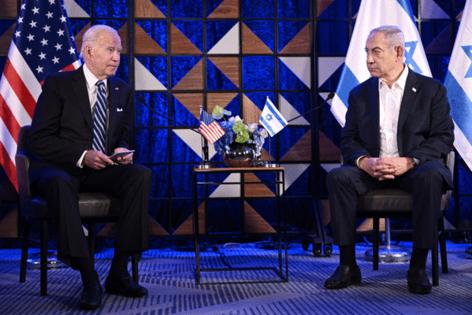Biden and Bibi back off their feud but suspicion lingers at home
Published in News & Features
U.S. President Joe Biden and Israeli Prime Minister Benjamin Netanyahu sought to turn down the heat in their unusually public feud over Israel’s war in Gaza Monday, but there was little sign the domestic political pressures that have pushed them apart are easing.
After weeks of growing vitriol between the two leaders over Israel’s punishing ground invasion of the Gaza Strip, the American president won a valuable concession in a telephone call with the Israeli prime minister on Monday — their first in more than month.
Netanyahu, widely known by his nickname Bibi, agreed to send a group of advisers to the U.S. to talk about Israel’s planned invasion of Rafah, where more than 1 million people have sought shelter from the fighting.
The visit will buy some crucial time for Biden, who has been the target of withering criticism from the left in the U.S. to do more to halt the bloodshed in Gaza after some 30,000 deaths and amid warnings of imminent famine.
“I continued to affirm that Israel has a right to go after Hamas, a group of terrorists responsible for the worst massacre of the Jewish people since the Holocaust,” Biden said of the call in a post on the social media platform X. He added that he had asked Netanyahu “to send a team to Washington to discuss ways to target Hamas without a major ground operation in Rafah.”
While celebrating the concession on Monday, officials were already speculating on how long it would last given the pressure both leaders are under from political forces back home.
Netanyahu’s far-right coalition partners want a more aggressive military posture in Gaza and reject a Palestinian state. The constituents Biden worries about — progressives, Muslim-Americans and young Democrats — want a permanent cease-fire and Palestinian sovereignty. It’s an existential threat for the U.S. leader given that they may withhold votes from him in the November election in key states such as Michigan.
“There’s a strange symmetry because both leaders are appealing to political groups they need to survive,” said Eytan Gilboa, a professor who specializes in U.S.-Israel relations at Bar Ilan University outside Tel Aviv. “The problem is that they’re on opposite sides.”
The agreement for a visit by Israeli officials, which came from a phone call from the two leaders, was a rare bright spot in a relationship that’s grown more and more strained in the months since Hamas fighters attacked Israel on Oct. 7, and Israel responded with a punishing air and ground campaign. The two leaders’ governments have taken to openly criticizing each other, and last week a group of senators urged Biden to halt military aid to Israel.
Schumer’s speech
...continued
©2024 Bloomberg L.P. Visit bloomberg.com. Distributed by Tribune Content Agency, LLC.







Comments